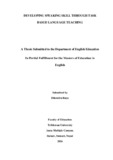Please use this identifier to cite or link to this item:
https://elibrary.tucl.edu.np/handle/123456789/1863| Title: | Developing Speaking Skill through Task Based Language Teaching |
| Authors: | Raya, Dikendra |
| Keywords: | Speech Skill;language teaching;Teaching methods |
| Issue Date: | 2016 |
| Publisher: | Faculty of Education Tribhuvan University Janta Multiple Campus, Itahari, Sunsari, Nepal |
| Abstract: | This research report Developing Speaking Skill through Task Based Language Teaching was aimed to find out the roles of Task Based Language Teaching in teaching English as a foreign language at the secondary level students‟ oral performance, enlist effective tasks and suggest some ways to develop speaking skill. It has been carried out practically. For this purpose, Public Higher Secondary School Dharan-13 was selected by purposive sampling method and 40 students from grade IX were taken as sample population. Test items and questionnaires were the main tools for data collection. A pre-test was administered to determine the existing proficiency level of the students. They were divided into two groups: experimental and control group on the basis of the sections they belonged to. After dividing them into two groups, both groups were taught 25 lesson plans separately. After completion of teaching 25 lesson plans, a post-test was administered using the same test item of the pretest. Then performance scores of the students of both tests were compared and analyzed. The main finding of the research is that use of task based language teaching was found more effective for developing speaking ability than traditional way of teaching. This thesis consists of five chapters. Each chapter is divided into different sub-chapters. The first chapter is an introductory chapter. It includes general background, statement of the problem, rationale of the research, objectives of the research, research questions, significance of the study and delimitations. The second chapter deals with the review of the related literature, implications of related literature, theoretical and conceptual framework. The third chapter deals with the methodology. It includes design of the study, sources of data, sample population, sampling 10 procedure, data collection tools, data collection process and data analysis and interpretation procedure. The fourth chapter deals with results and discussion. It includes interpretation of pretest and posttest, interpretation of students‟ responses and ways to develop students‟ speaking ability. The fifth chapter deals with summary, conclusions and implications. |
| URI: | http://elibrary.tucl.edu.np/handle/123456789/1863 |
| Appears in Collections: | English Language Education |
Items in DSpace are protected by copyright, with all rights reserved, unless otherwise indicated.

